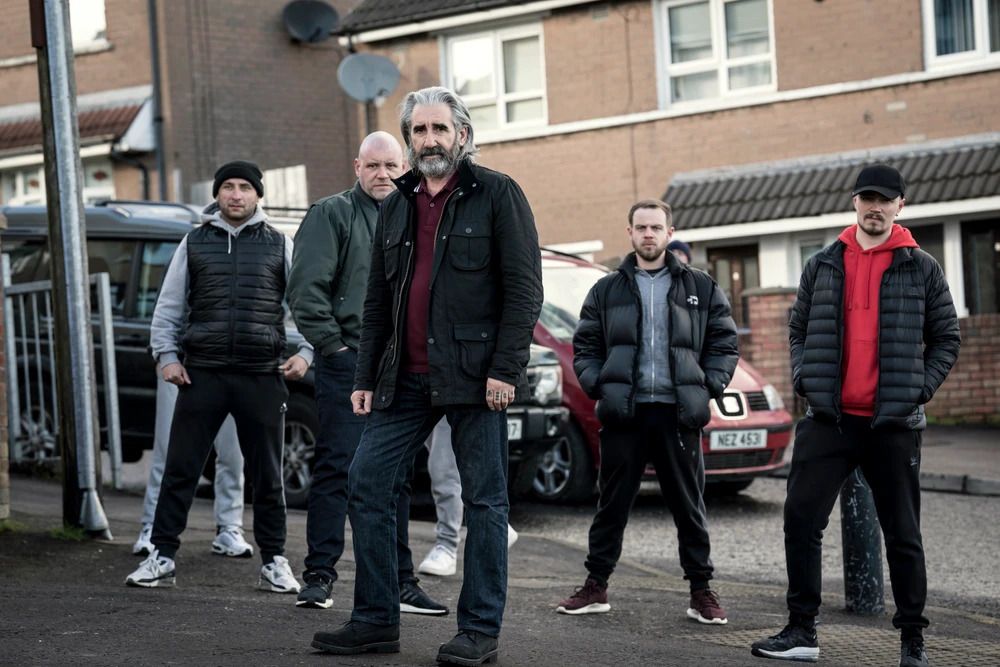'We go into this crime scene together - because we're a brotherhood. WITH a banner. See what I did there?' Photos: Handout
Cop shows coming out of Hollywood (hi, The Rookie), or Canada (hi, Rookie Blue), or even our very own Gerak Khas may have painted a particular picture in our minds, over the years, about the position of police officers in a community.
Picture this, then: a place where police officers have to check under their cars for explosives every morning when they're about to leave for work. Or where bystanders don't offer apples to "coppers" but spit on them or throw oranges (the more "off" the better) at their cars or even their heads.
Where venturing into an OOB (out of bounds) neighbourhood is akin to stepping into a war zone, and where well-placed persons of interest (Dirty Harry would just call them "punks") can even bust a constable's nose for a lark and then claim provocation.
This is Belfast, Northern Ireland, the location for the excellent, riveting cop drama Blue Lights, and by some accounts, the show sums things up accurately enough. (I am suddenly very thankful for PJ, jackass motorists and all.)
The show follows three rookie constables, their training officers and assorted colleagues as they struggle to make their way; and also takes a look at the "protected" organised crime family that opposes them through most of the show.
Its volatile setting alone is reason enough to tune in to Blue Lights, created by Declan Lawn and Adam Patterson, best known for last year's Rogue Agent with James Norton and Gemma Arterton (about the real-life conman who posed as an MI6 agent).
In addition to setting up its little corner of Belfast so vividly, the show also excels at making all its characters – even one unrepentant, unlikeable climber of the ranks – living, breathing people who quickly elicit the appropriate regard, or revulsion, from the audience.
That it does so within such a short span of time speaks highly of its writers and cast, and one of the show's greatest achievements is in conjuring up such tangible relationships (they're not all "friendships", mind you) in the confines of a six-episode season.
Among the characters we become invested in quickly enough: probationers Grace Ellis (Sian Brooke, Sherlock's secret sister and Queen Aemma Arryn in House Of The Dragon), a social worker turned cop; Annie Conlon (Katherine Devlin), a Catholic who hides her chosen occupation from her friends; and Tommy Foster (Nathan Braniff), a fast-track probationer who can't shoot to save his life and worries about failing his upcoming test.
Guiding them through Belfast's inhospitable streets are veterans Gerry Cliff (Richard Dormer, Game Of Thrones' Beric Dondarrion), who takes a keen interest in Tommy's future on the force; Stevie Neill (Martin McCann), who hides a sad past behind gourmet packed lunches; and Sgt Helen McNally (Joanne Crawford), who covers up her compassion with a no-nonsense exterior.
It's a rough job though they're all up for making a go of it, but are hamstrung because their team leader Insp "Johnty" Johnson (Jonathan Harden) is in cahoots with covert intelligence forces, aka "sneaky beakies", who have an unexplained interest in the local McIntyre crime family.
And then we have the McIntyres – patriach James (John Lynch), blustery and ambitious son Mo (Michael Shea), and assorted goons and their loved (sometimes unloved) ones.
Lawn and Patterson juggle these different types and personalities so skillfully that each episode not only stands well on its own but builds towards a devastating one-two punch in the finale (and the tail end of the preceding episode, be prepared to sit slack-jawed as your popcorn/crisps fall out of your gob).
There's deft use of foreshadowing and red herrings – not that red as to appear contrived, though – throughout several episodes, particular one in which the Police Ombudsman (yes, they have one of those) investigates a hectic night shift that ends in tragedy.
The MVP out of the uniformly (heh) brilliant cast has to be Dormer, whose fatherly wisdom is peppered with a grim awareness of reality on the streets, not to mention comments that ought to earn him a trip to Human Resources (though they are directed at his missus, in a cheeky, loving way that again says so much with just banter and sideways glances).
Blue Lights – renewed for a second series, yay – works because it emphasises the humanity of the people in uniform, as well as the ones arrayed against them, and does so without forcing judgment on us. Ooh, respect for the audience: another bonus.
All six episodes of Blue Lights Season One are available on the BBC Player.
Summary:
Rookie black-and-blue blues







